Self Awareness Teaching Resources
Help your students develop self awareness with activities, printables and more social and emotional teaching resources designed specifically for primary school students.
Created by teachers, for teachers, this collection is full of digital and printable activities designed to help students recognise their emotions and learn to identify their own strengths and weaknesses. Each teaching resource has undergone rigorous review by the Teach Starter team to ensure it's ready for the classroom ... and your students!
Curious about teaching self awareness and wondering how it applies to kids in your classroom? Read on for some tips from our expert teachers!
What Is Self Awareness? A Kid-Friendly Definition
Most students are not terribly self aware when they enter primary school, and that's completely normal. After all, any adults aren't very adept at self awareness! That's why it's so important to include these lessons in your planning to help students flex those muscles and become more aware of who they are.
So how do you explain the meaning of self awareness to your class, and how do you teach it? Let's start with a kid-friendly definition.
Self awareness means understanding yourself, your feelings and how your actions affect other people.
You might tell your students that being self-aware is a bit like having a mirror inside your mind that can help you see who you are and how you can make good choices.
Explain to students that when you're self-aware, you know what you're good at and what you might need to work on to become your own superhero.
Why Is Self Awareness Important?
Learning to be self-aware is part of gaining control of one's own emotions, thoughts and actions, and the lessons we teach in the classroom contribute to our students' personal growth, social interactions and overall well-being in the immediate future and well into adulthood.
When kids (and adults!) lack self awareness, they tend to struggle with poor decision-making, and they may have trouble understanding how their behaviour affects others. This can lead to misunderstandings and conflicts with peers and others around them or even unintentional harm to relationships, as they may struggle to empathise or consider the perspectives of others.
Self Awareness Examples for Kids
Explaining self-awareness by providing a definition is one thing, but surely you want to dig a little deeper.
Here are some examples from our teacher team that you can use to illustrate what it means to be self-aware — and why it's so important!
- Identifying Emotions — Being able to label our emotions with names like happiness, sadness, anger or excitement is a great example of being self-aware. For example, your students might learn to say, 'I feel happy when I play with my friends at recess.'
- Understanding Your Talents — Another example of self awareness that kids can easily relate to is identifying one's strengths or talents. It can be helpful to consider things we can do well and things we want to work on to improve. For example, a student might say 'I am very good at singing, but I would like to practise my spelling to improve.'
- Seeing Strengths in Our Peers — Acknowledging our own strengths is only part of being self-aware. It's also good for students to identify (and celebrate) the strengths of others. This will help them build better relationships in the long run.
- Plus Plan
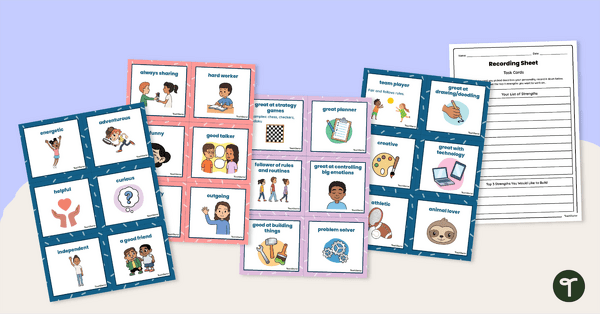
Focusing on Strengths Sorting Cards
Identify individual strengths with this set of strength vocabulary task cards.
- Plus Plan
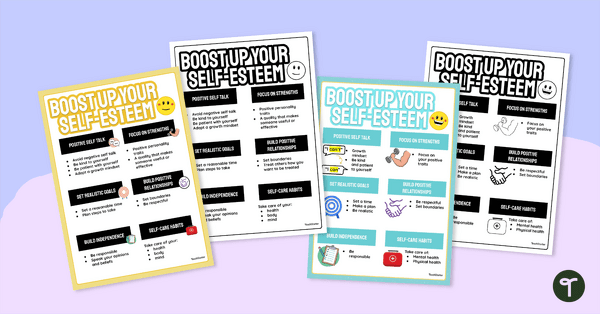
Building Self-Esteem Poster Set
Help your students learn how to boost their own self-esteem with this set of classroom posters.
- Plus Plan
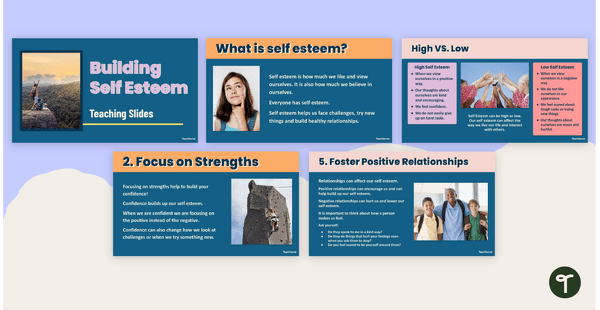
Building Self-Esteem Teaching Slides
Explore how to build up self esteem with this set of teaching slides perfect for social emotional learning lessons.
- Plus Plan
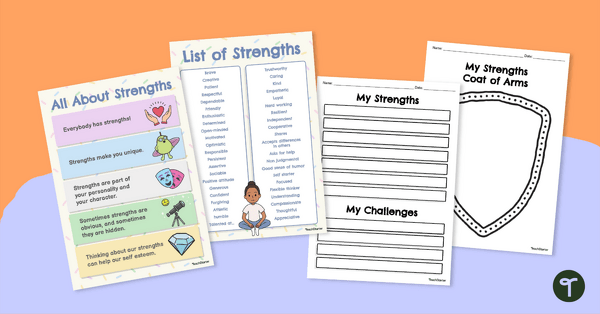
All About Strengths Poster and Worksheet Pack
Help your students identify their personal strengths and weaknesses with this poster and worksheet pack.
- Plus Plan
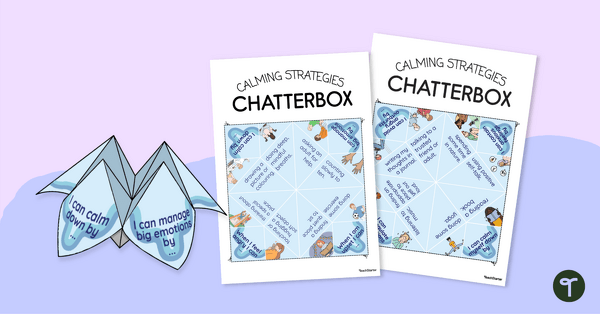
Calming Strategies Chatterbox Template
Help your students choose and apply strategies when they need to calm down with this handy chatterbox template.
- Plus Plan
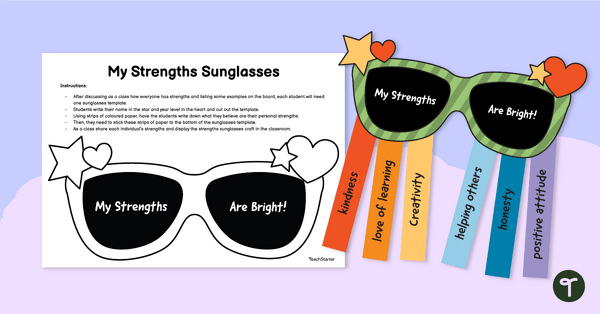
My Strengths Sunglasses Template
Teach your students how to identify their strengths with this fun craft activity.
- Plus Plan
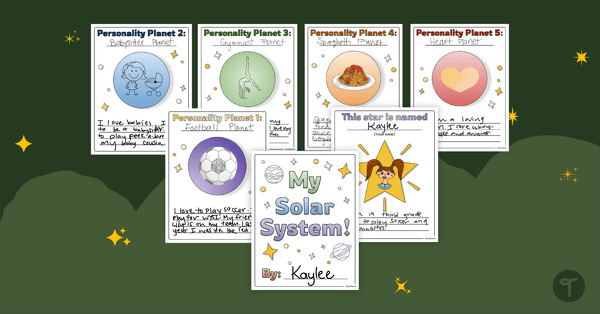
Personality Planets – All About Me Craftivity
Encourage students to reflect about what makes them unique and special with this all about me craftivity.
- Plus Plan
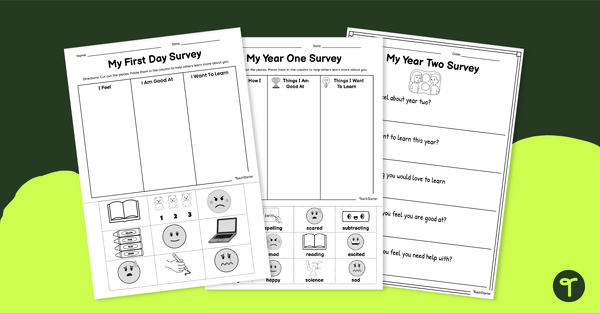
Back to School Surveys - All About Me
First Day of School Student Surveys.
- Plus Plan
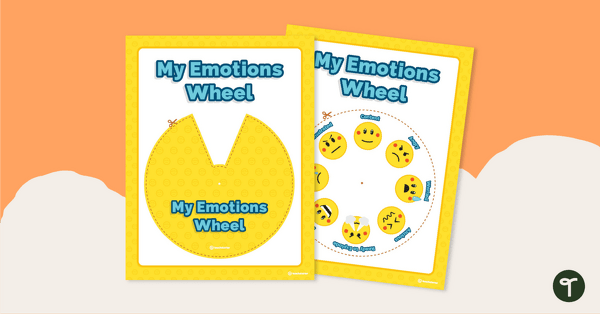
My Emotions Wheel
Help students communicate how they are feeling with this emotions wheel template.
- Plus Plan
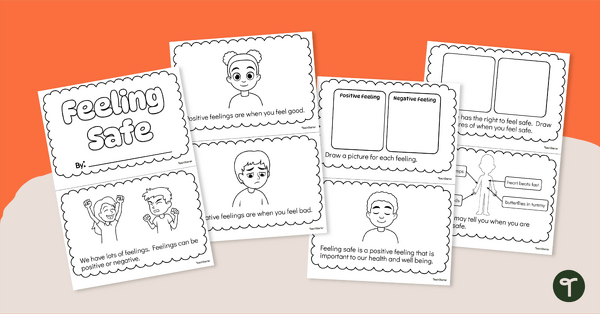
Feeling Safe Mini-Book
Explore positive and negative feelings and what it feels like to be safe with this mini-book.
- Plus Plan
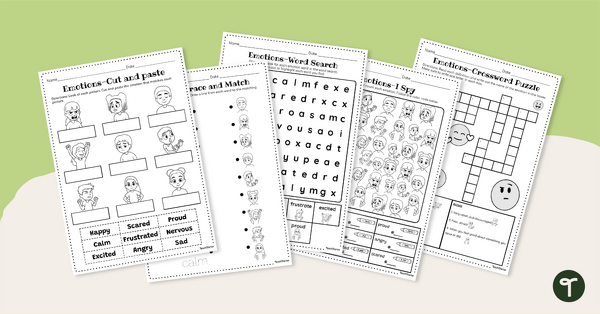
Emotions Worksheet Set
Help students understand different emotions with this set of five emotions worksheets.
- Plus Plan
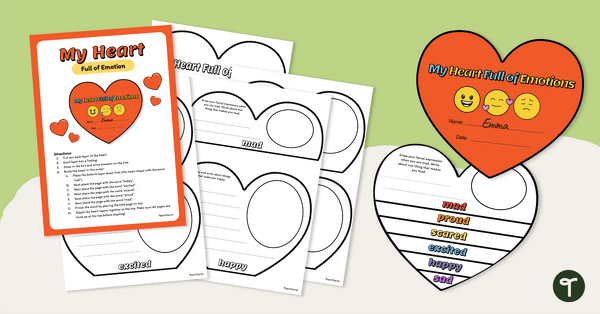
My Heart Full of Emotions Activity
Promote mindfulness and self reflection by writing out descriptions of different emotions.
- Plus Plan
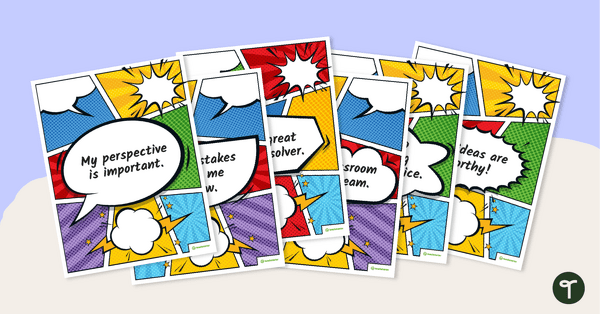
Positive Affirmations for Kids - Posters
Help your students overcome self-doubt with this set of posters containing positive affirmations for kids.
- Plus Plan
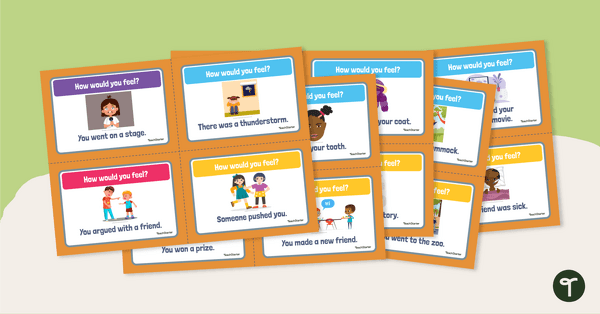
How Would You Feel? Scenario Cards
Foster students’ emotional intelligence and develop emotional vocabulary by exploring a range of real-life scenarios.
- Plus Plan
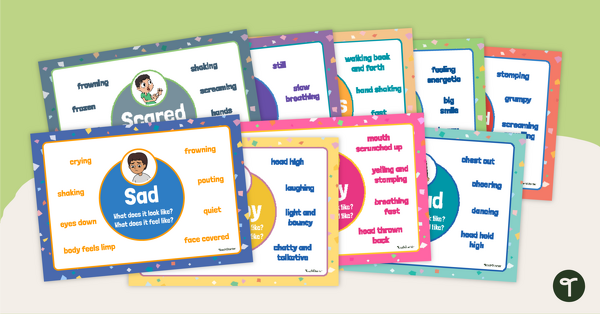
Characteristics of Emotions - Posters
Help students learn the facial expressions and body cues that accompany the most common emotional states with this set of classroom display posters.
- Plus Plan
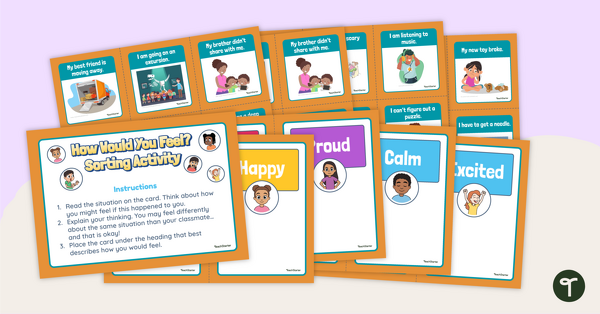
How Would I Feel? Sorting Activity
Explore students’ emotional intelligence and develop emotional vocabulary through real-life scenarios.
- Free Plan
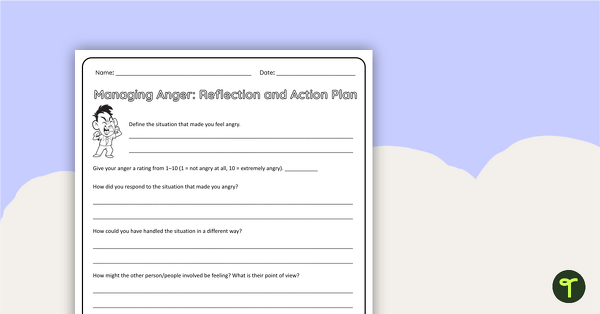
Managing Anger Worksheet (Upper Primary)
Help older students identify and manage angry feelings with this self-reflection and action plan worksheet.
- Free Plan
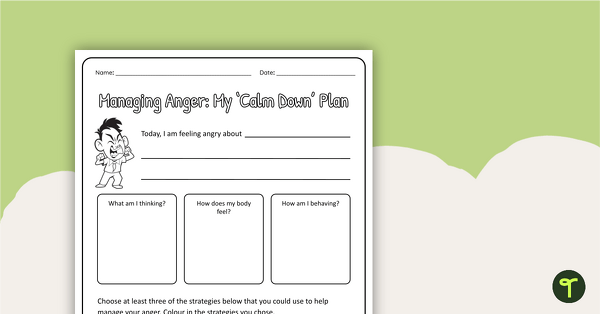
Managing Anger Worksheet (Lower Primary)
Help students identify and manage their anger with this self-relfection worksheet.
- Plus Plan
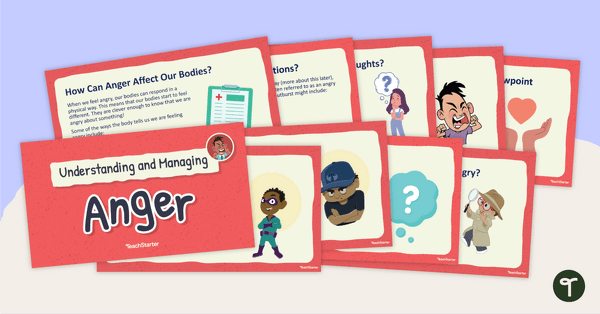
Understanding and Managing Anger Teaching Presentation
Teach your students about angry feelings with this comprehensive guide to understanding and managing anger.
- Plus Plan
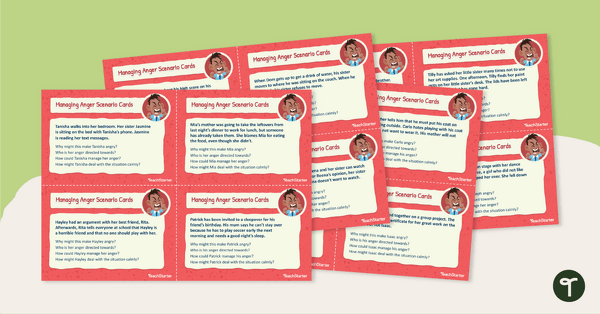
Managing Anger Scenario Cards
Explore ways to manage anger in a variety of real-life situations with this set of 16 scenario cards.
- Free Plan
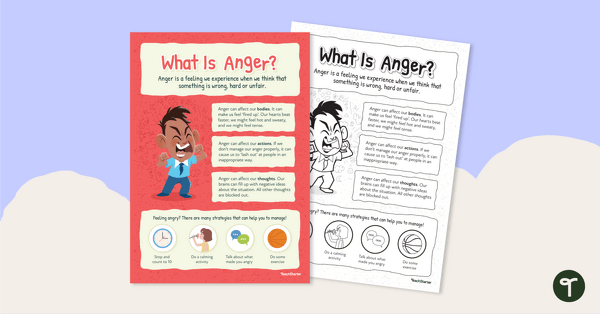
What Is Anger? Poster
Teach your students to understand and manage anger with this informative classroom display poster.
- Plus Plan
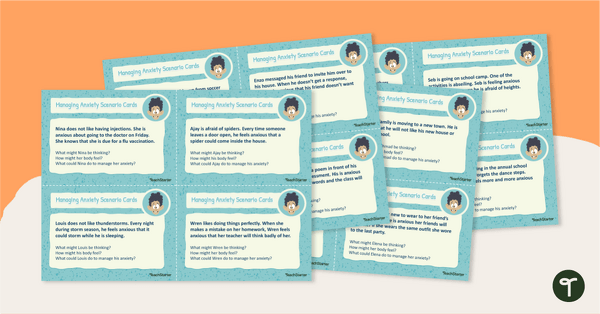
Managing Anxiety Scenario Cards
Explore ways to manage anxiety in a variety of real-life situations with this set of 16 scenario cards.
- Free Plan
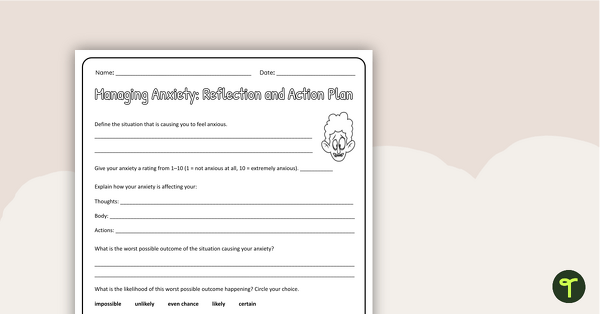
Managing Anxiety Worksheet (Upper Primary)
Help older students identify and manage anxious feelings with this self-reflection and action plan worksheet.
- Free Plan
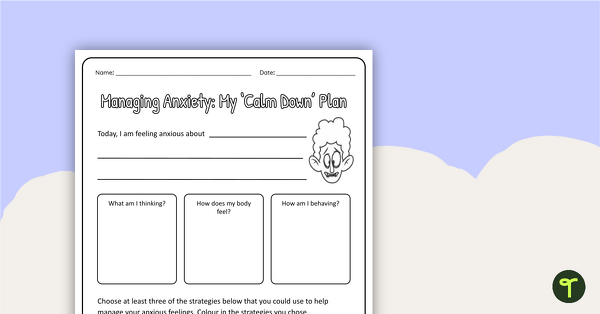
Managing Anxiety Worksheet (Lower Primary)
Help students identify and manage anxious feelings with this self-reflection worksheet.
- Free Plan
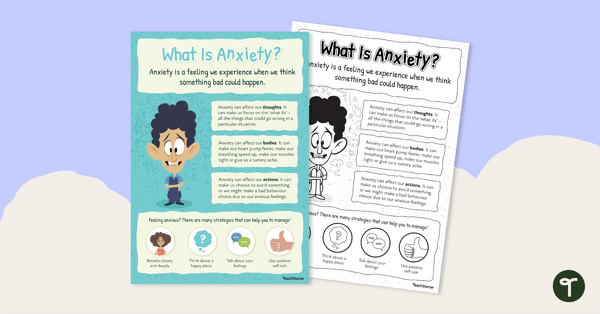
What Is Anxiety? Poster
Teach your students to understand and manage anxious feelings with this informative classroom display poster.
- Free Plan
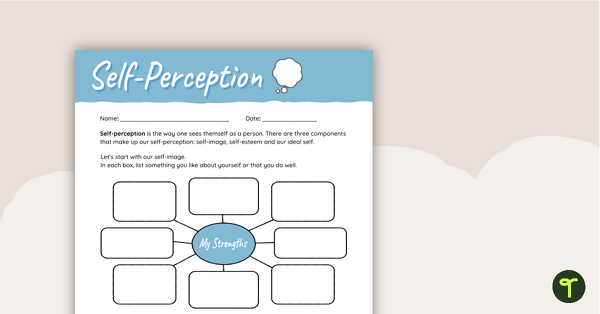
Self-Perception Worksheet
Identify strengths and areas of growth by asking students to reflect on their self-image, self-esteem, and ideal self.
- Free Plan
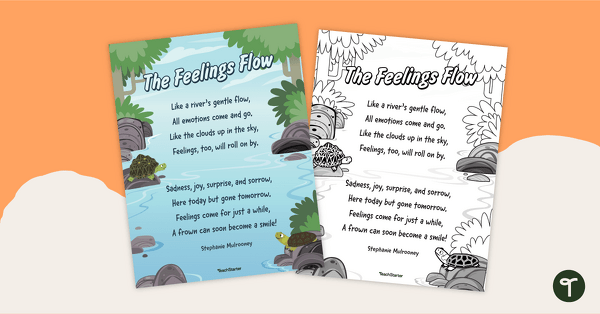
The Feelings Flow Poster
Help students understand the transient nature of emotions with this simple poem about feelings.
- Plus Plan
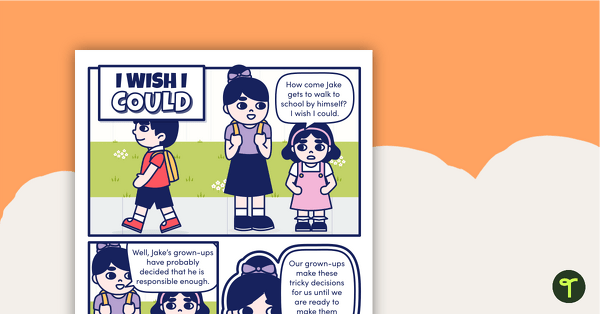
I Wish I Could – Worksheet
A comprehension worksheet for a comic from the Year 2 magazine (Issue 3).
- Plus Plan
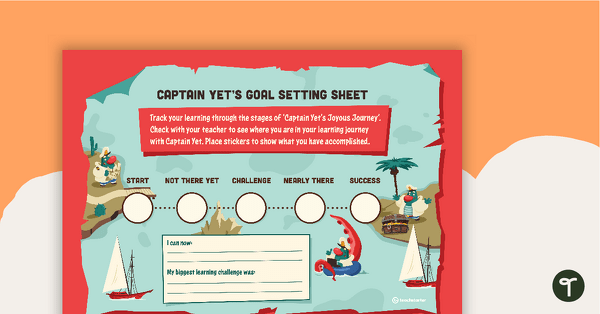
Growth Mindset Goal Sticker Chart (Captain Yet Version) – Template
Print a growth mindset sticker chart template for students to track the progress of their goals.
- Plus Plan
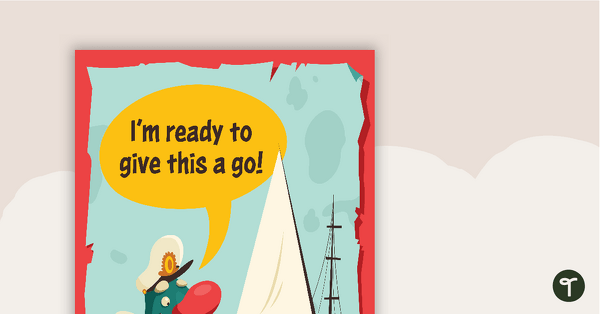
Are We There Yet? — Growth Mindset Posters
Print thse large growth mindset posters to help students learn to work more resourcefully and independently in the classroom.
- Plus Plan
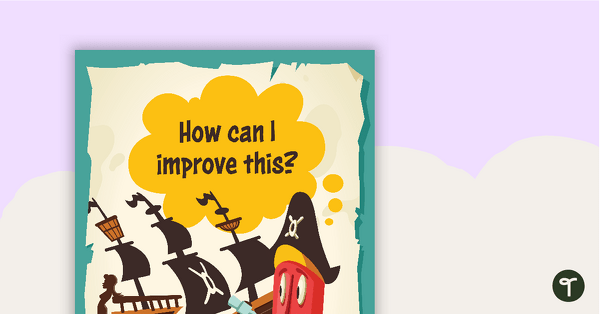
Growth Mindset Captain Yet: Nup's Odyssey It's Not Over Yet – Large Posters
Large Captain Yet posters to help students learn more resourcefully and independently in the classroom.
- Plus Plan
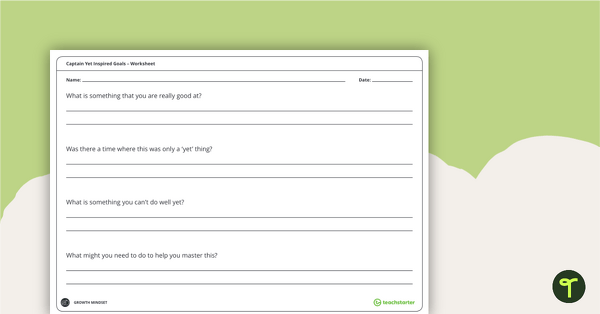
Growth Mindset Inspired Goals – Template
A reflection template for students to use their strengths and Captain Yet's strategies to achieve their goals.
- Self Awareness Worksheets
- Self Awareness Posters
- Self Awareness Templates
- Self Awareness Labels, Signs & Decorations
- Self Awareness Games
- Self Awareness for Foundation Year
- Self Awareness for Year 1
- Self Awareness for Year 2
- Self Awareness for Year 3
- Self Awareness for Year 4
- Self Awareness for Year 5
- Self Awareness for Year 6